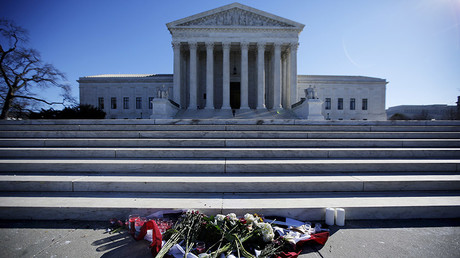Legal experts warned that the US Supreme Court would be unable to decide a number of cases as a consequence of Justice Antonin Scalia’s death. On Tuesday, the first split decision arrived.
The case of Hawkins v. Community Bank of Raymore won’t send waves throughout the US, but the outcome of a 4-4 ruling by the Supreme Court shows just how complicated deadlocked issues could be moving forward.
Since the decision was a tie and delivered in the name of the whole court, the vote count was not officially released, nor is it known which justice voted for which side.
Referring to the last decision on the issue rendered by the US Circuit Court of Appeals for the Eight District, the justices wrote only: “The judgment is affirmed by an equally divided Court.”
As a result, no nationwide precedent has been set, and the Supreme Court leaves intact the lower court’s decision.
The case itself revolved around whether spouses can be held as guarantors for bank loans. In 2008, the Community Bank of Raymore in Missouri approved $2 million in residential development loans to a local company, on the condition that the wives of the two men who owned the business also signed the guarantee.
The women, Valerie Hawkins and Janice Patterson, agreed to do so. After the company failed to make payments on the loans in April 2012 and the bank declared them to be in default, it demanded payment from both the business and the two women who were co-guarantors.
Hawkins and Patterson sued the bank, claiming that they were discriminated against simply because they were married to the men seeking the loans, and that the bank violated the US Equal Credit Opportunity Act, which bans discrimination against applicants based on marital status.
The entire case hinged on whether the women could be considered “applicants” simply because they guaranteed the loan. The two plaintiffs did not claim to be applicants based on any other basis, according to the Eighth Circuit Appeals Court.
The court ultimately found in favor of the bank, but the deadlocked Supreme Court decision will leave different interpretations of the law on the books in a number of states. The Eighth Circuit ruling applies only to the states in its jurisdiction: Arkansas, Iowa, Minnesota, Missouri, Nebraska, North Dakota and South Dakota.
A conflicting decision was made for states in the Sixth Circuit and is still the law in Kentucky, Michigan, Ohio, and Tennessee, according to Politico. A separate ruling was made in the Seventh Circuit, which affects courts in Illinois, Indiana, and Wisconsin, that did not make it clear whether the Equal Credit Opportunity Act can be invoked in similar situations.
A number of cases could lead to similar fractured results, unless Congress confirms a justice to succeed Scalia. On March 16, President Barack Obama nominated Merrick Garland, currently a judge at the US Court of Appeals for the District of Columbia.
Pending before the Supreme Court are high profile abortion cases, such as one involving women’s right to access nearby clinics, and disputes over whether labor unions can collect fees from workers they represent but may not want to pay up. Also pending are further challenges to President Barack Obama’s healthcare law and his executive orders on immigration.
Via RT. This piece was reprinted by RINF Alternative News with permission or license.








